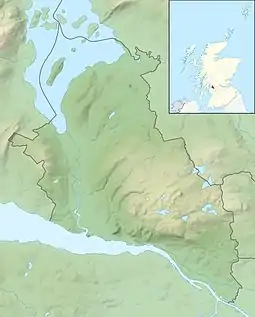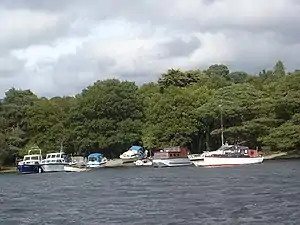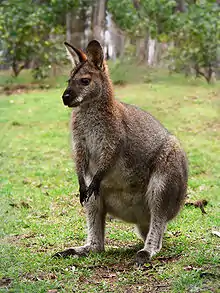Inchconnachan
Inchconnachan (Innis Chonachain in Gaelic, meaning 'The Colquhoun's Island') is an island in Loch Lomond in Scotland, in the Trossachs National Park.[5] It is accessible by boat from the village of Luss on the south side of the Loch.
| Scottish Gaelic name | Innis Chonachain |
|---|---|
| Meaning of name | The Colquhoun's Island |
| Location | |
 Inchconnachan Inchconnachan shown within Scotland | |
| OS grid reference | NS375918 |
| Coordinates | 56.091°N 4.612°W |
| Physical geography | |
| Island group | Loch Lomond |
| Area | 35 ha[1] |
| Area rank | (Freshwater: 12) [2] |
| Highest elevation | 50 m |
| Administration | |
| Sovereign state | United Kingdom |
| Country | Scotland |
| Council area | Argyll and Bute |
| Demographics | |
| Population | ~60 Wallabies |
| References | [3][4] |

The island is uninhabited apart from a holiday home: it is an Area of Special Scientific Interest and a Special Area of Conservation.
Wallabies

Wallabies, of the species Macropus rufogriseus (Red-necked Wallaby), were introduced by Lady Colquhoun in the 1940s, and still roam wild. It is one of the very few places outside Australia which has a viable population of wallabies.[6]
More recently, there has been great controversy over them, and it has been suggested that they should be culled, or eradicated, as they supposedly threaten the capercaillie population.[7] The cull has proven controversial, as some tourists visit the area specifically to see them, and because some animal rights activists consider it cruel. Iain Sheves, factor for Luss Estates, has said,
- "If it comes down a decision between rare native species, which are perhaps better served by being on an island because of predation issues, and a non indigenous population of creatures which shouldn’t really be there then we’ve got to go with the native species every time.
- "I would hope that people come to Scotland to see native wildlife and habitats rather than a quirk of history.
- "Ultimately, we all have a responsibility to try and promote and protect our native wildlife. To disregard that in order to maintain a tourist oddity is not the right thing to do."[8][9]
Over the years, there have been several unauthorized cullings, which have shocked Scottish locals and tourists visiting the island, who stumble upon, the often mutilated, bodies of the island's wallabies. No perpetrators have been found, and the motive is unknown. [10]
Sale
On 9 July 2020, Inchconnachan Island is put up for sale by the Colquhoun family with a price tag of offers over £500,000.
The sale includes a derelict colonial-style timber bungalow dating from the 1920s, built for the tea merchant Admiral Sullivan, which was later the holiday home of the family of Lady Arran Colquhoun. Planning consent and detailed architectural drawings are in place to replace the bungalow with a new four-bedroom lodge and one-bedroom warden's house, along with a boat house and pier.[11]
Footnotes
- Rick Livingstone’s Tables of the Islands of Scotland (pdf) Argyll Yacht Charters. Retrieved 12 Dec 2011.
- Area and population ranks: there are c. 300 islands over 20 ha in extent and 93 permanently inhabited islands were listed in the 2011 census.
- Ordnance Survey
- "Overview of Inchconnachan". Gazetteer for Scotland. Retrieved 2007-08-24.
- Steven, Alasdair (10 June 2013). "Obituary: Countess Arran, power-boat champion". The Scotsman. Johnston Press. Retrieved 29 October 2017.
- "Loch Lomond Islands: Inchconnachan". Loch Lomond.net. Retrieved 2014-11-05.
- Scottish Daily Record, 06/06/2009 Colony of Wallabies set for cull
- Wallabies face being wiped out Jun 5 2009 by Marc McLean, Lennox Herald
- "Loch Lomond wallabies set for cull to protect local wildlife". 2009-06-05.
- McGivern, Mark (2017-08-14). "Wallaby colony on Loch Lomond under attack from macabre killer". dailyrecord. Retrieved 2019-05-08.
- "Uninhabited Loch Lomond 'wallaby island' up for sale". BBC.com. 9 July 2020.
External links
- https://web.archive.org/web/20090710015304/http://lochlomond-islands.com/
- article which mentions it
- Inchconnachan 2009
| Wikimedia Commons has media related to Inchconnachan. |